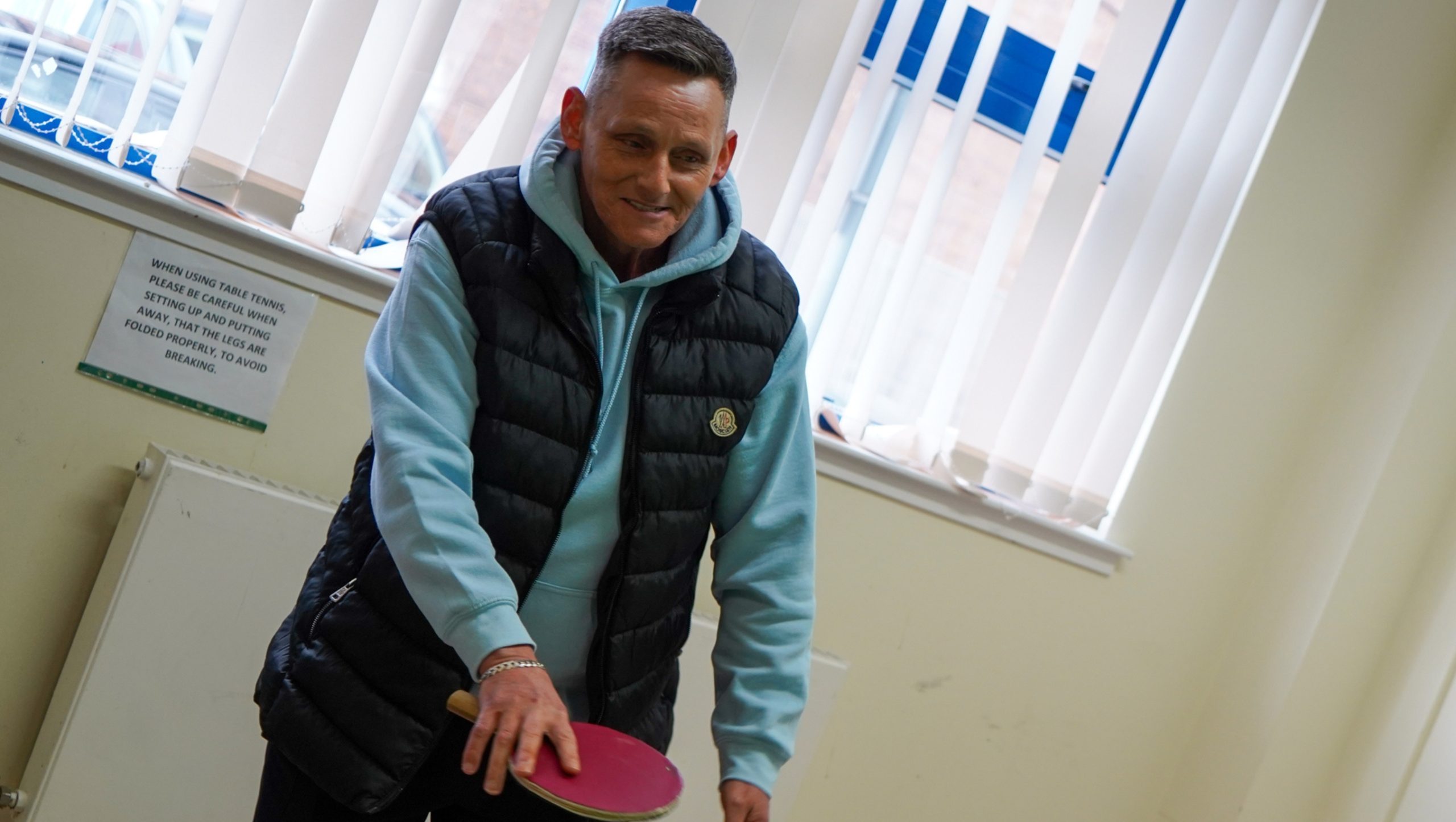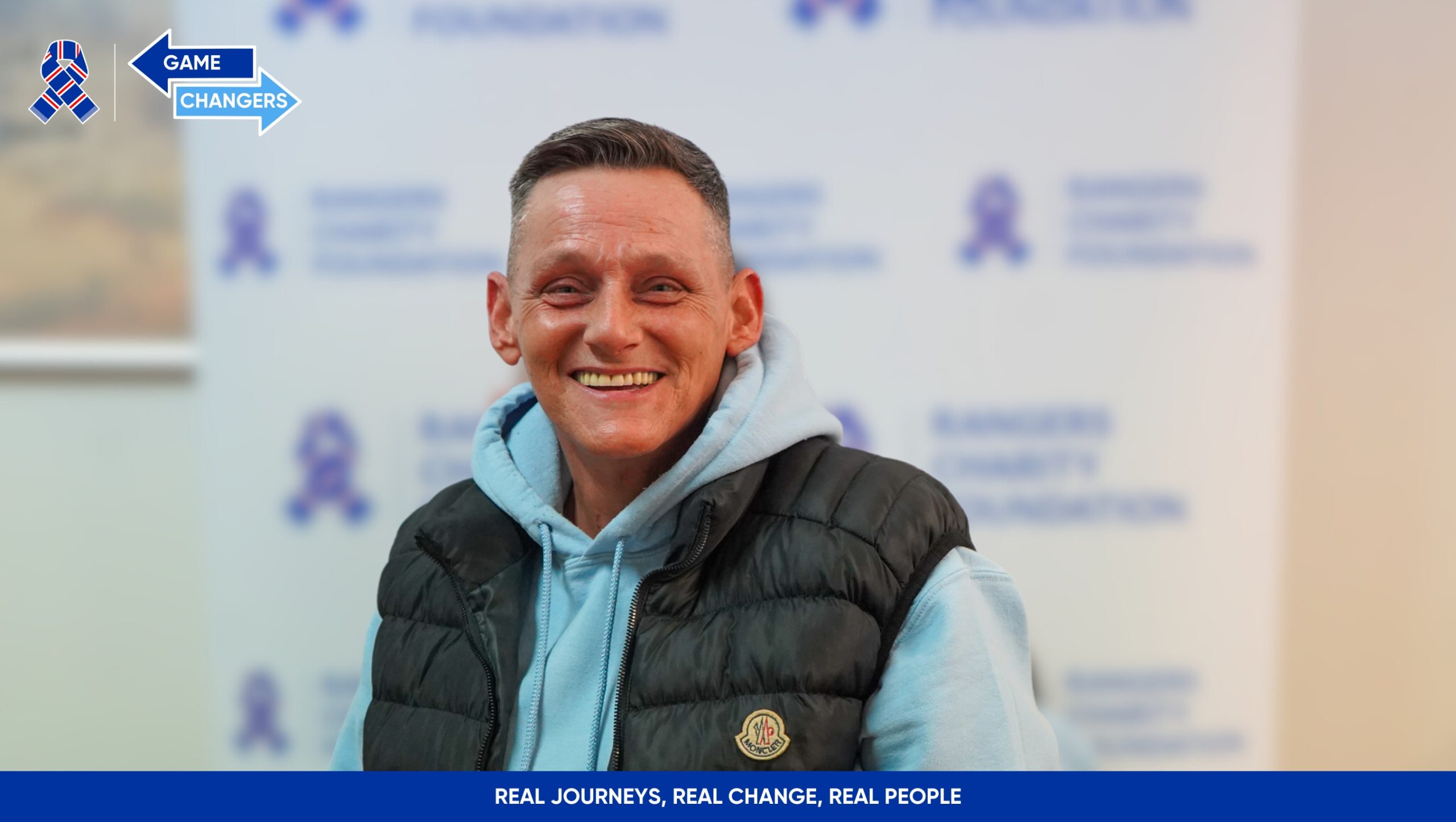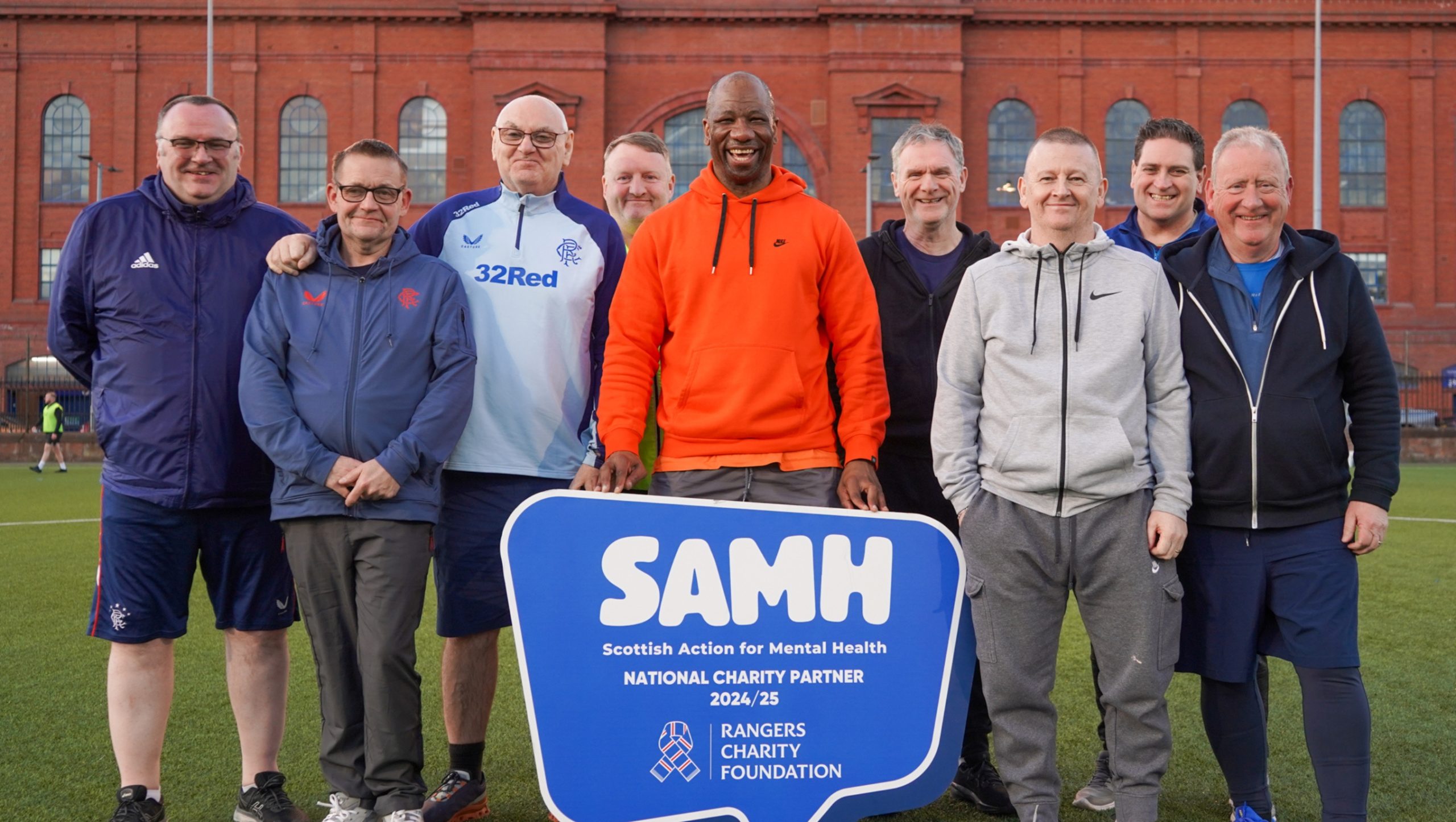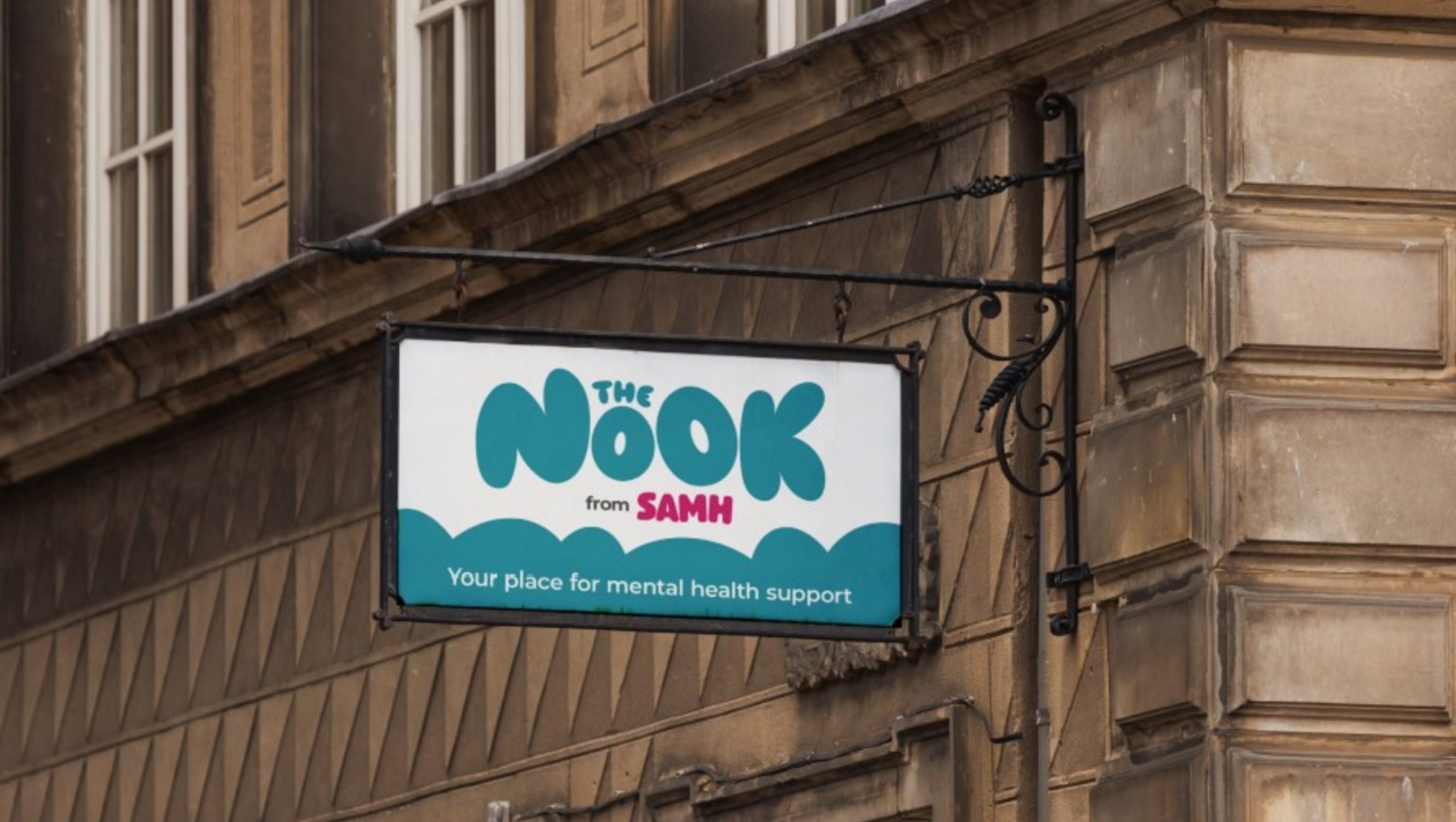News
GAME CHANGERS: From Isolation to Inspiration – Alex’s Recovery Journey
Fri 21st February 2025
Addiction can take hold of a person’s life in ways that are difficult to escape, but Alex Scott’s story shows that recovery is possible with the right support and determination. His transformation highlights the impact that compassion can have in changing lives, and we are proud to present Alex as our second Game Changer.
Our Game Changers series celebrates the inspiring stories of those who have had the courage and drive to make positive changes in their lives through their participation in Rangers Charity Foundation activities.
Alex has attended and now volunteers at our Recovery Drop In sessions which are run every week in partnership with South Community Recovery Network (SCRN) at the Ibrox Community Complex and the Adelphi Centre. They provide a safe and friendly place to meet for local people recovering from addiction. His journey has been one of hardship, perseverance, and ultimately, transformation.
Alex’s struggles with addiction began at an early age and shaped much of his life. Like many suffering from addiction, his upbringing did not provide him with the ideal environment to grow up in.
He said:
“I’m from and grew up in Possilpark. Growing up in the seventies in Glasgow, there was a lot of poverty.
“You could say my childhood was difficult. I grew up with alcoholic parents, which for me seemed standard. Going through school I was a shy wee guy and with alcohol being involved at home and there being fights and things like that, I was always quite reserved.
“I was introduced to solvents at the age of 12 and through using those, I started feeling a bit more confident in myself and rebelling in class. I ended up becoming the class clown and at the time, I thrived on that because I didn’t get that attention in the house.”

From an early age, his life soon became a destructive cycle, influencing the decisions he made and the people he surrounded himself with. As his substance use escalated, so did the challenges he faced, setting him on a path that would take decades to break free from.
He went on to say:
“I ended up leaving school and at that time, my goals and aspirations were just to get by. I actually wanted to be a footballer growing up, but I was dropped from the football team, and I think that dented my confidence a lot. After that I was edged into boxing. I took that up from ages 13 to 16, but using solvents really impacted my commitment to the sport, so that didn’t work out either.
“When I wasn’t involved in anything to keep me occupied, I started hanging around in streets and closes with the wrong crowds and before I knew it, I had a needle in my arm at the age of 16.”
“From that point on, my life revolved around using hard drugs.”
As his addiction spiralled, Alex’s social circle consisted of those in the same struggle, and his days became a cycle of using, and surviving. Without a strong support system or guidance, he continued down this path for years, struggling to find a way out.
“I didn’t have any real role models in my life, so the only people I could look up to were the same individuals that I was up the closes with and that’s how I ended up myself.
“I found myself in a lot of co-dependent relationships and not knowing how to live a real life free of solvents and hard drugs. In fact, you could probably describe it as existing rather than living. In 1998 I heard about methadone, and I was on that for 25 years while still using different drugs because I didn’t know how to stop.
“I did try to stop, and I had mild success, if you could call it that, but I could never stay completely clean. I was in and out of hospital, and I was just isolating myself away from the world.
“My life just became monotonous, and my mental health took a real dip. I thought I was in control of my using but through working on myself and looking back, I can see that I clearly wasn’t.”

For years, Alex believed that he could handle his addiction on his own, but the reality was far different. His attempts to stop were short-lived, and he often found himself right back where he started. The impact on his mental health was profound, and isolation became his way of coping. It wasn’t until a moment of vulnerability that he finally allowed himself to accept help.
“I think that thought of doing it myself and that false pride I had really prevented me from asking for help earlier but I can see now that it wouldn’t have been possible because I had no power over my own life. I was never in control of my addiction and that hurt a lot of people that cared about me and my family too.”
“My life was just utter carnage from the age of 12 all the way through to 52 which is when I was introduced to recovery.”
“The last time I was in hospital I just thought to myself, I can’t do this anymore and I said that to the nurse. She asked me if I wanted to see someone, and I couldn’t say no this time. Just that small showing of a bit of kindness and empathy hit home because my life up until that point was really transactional.
“After that spell in hospital, I met an outreach worker, and he brought me down to Recovery Drop In. I was nervous, anxious and I felt like I wanted to run away before my first meeting because I had been isolating myself for the best part of 12 years before I started my recovery journey.”
Stepping into a recovery program for the first time was daunting. After years of isolation, reconnecting with others felt foreign, and the idea of sharing his experiences seemed overwhelming. However, the kindness and support he received from volunteers and peers helped break down those barriers. Through these meetings, Alex had the opportunity to finally turn things around.
He said:
“At my first meeting I didn’t really have much to talk about, but the volunteers just gave me a wee bit of their time and shared their experiences and that helped put me at ease. For me, the main thing coming here gave me was a chance to escape the isolation I was imposing on myself. Connecting with other people that were on their own recovery journey and getting a bite to eat and chat really put me on a better path. It also gave me some structure to my life and a purpose to get up and out the door in the morning and try break that cycle of monotony.”

SCRN have initiatives running throughout the south of Glasgow which are delivered by volunteers with lived experience in overcoming barriers in their lives. These volunteers call upon their own knowledge to assist others in their recovery journey.
Alex added:
“The whole project has been really good for me. After I started attending consistently, I had a chat with SCRN Recovery Project Manager, John McCann, and he said that if I kept it up then I could start volunteering myself. It wasn’t an easy journey because when I came down at first my behaviour could probably be described as erratic, but the volunteering definitely helped with that, and I feel like I’ve matured a lot.
“What volunteering and chairing these meetings is teaching me is how to be responsible, punctual, committed and all these things are helping me prepare for employment because that’s probably my next step.
“My life has changed dramatically since attending Recovery. Just one example of that is that I had never had a passport before coming here. Now I can say I’ve been abroad and worked with Erasmus, which has been a great experience and something I never would have been able to do.”
“I feel more at peace within myself, and I’ve got more self-esteem and self-worth which has turned me into the person that I am today.”
“I am proud to say that as of a couple of weeks ago, I’m three years clean. It’s amazing to think that for 40 years I couldn’t go a day without using.”
Whether they attended one of our wide range of community courses, achieved a qualification, accepted help to find a job, attended counselling, got fitter, took steps towards addiction recovery or re-engaged in their education and future potential, our Game Changers like Alex have one inspirational thing in common – they have been empowered by the Foundation to overcome barriers in their lives and ‘change the game’ in their own lives.
We are grateful to the National Lottery Community Fund for their funding support of the Foundation’s Recovery Drop In programme.
For more information on Recovery Drop In, you can visit the programme page on our website here. Meetings take place on Monday’s at the Ibrox Community Complex and Wednesday’s at the Adelphi Centre between 17:30 – 20:30 and 11:00 – 14:00 respectively. You can also read our full programme impact report for season 2024/25 here.







